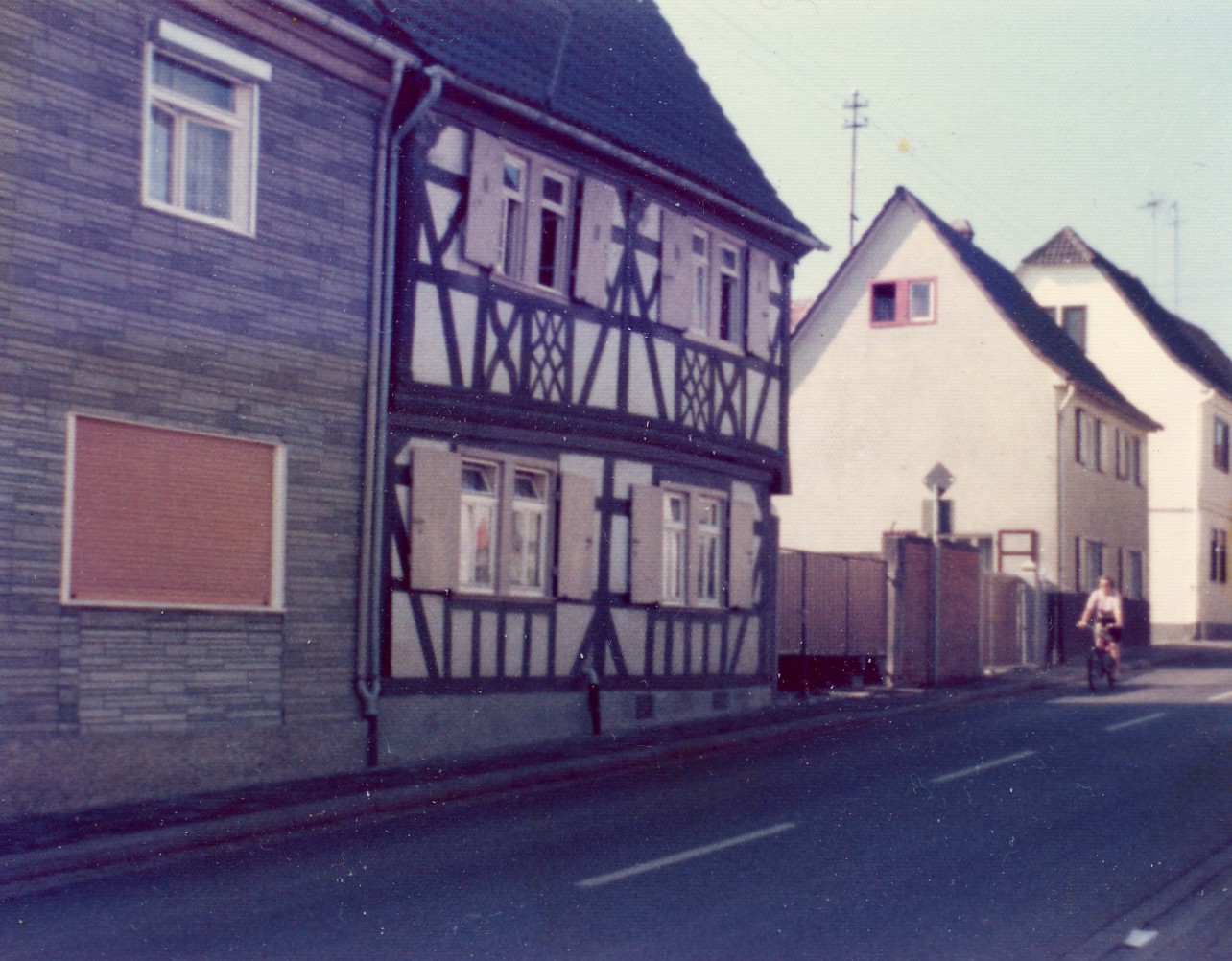

In early 1945, towards the end of World War II, my mother, who had been a war widow since October 1943, and I, age six, were forced to move out of our apartment in Fechenheim because of the destructive air attacks on Frankfurt. We lived only two miles east of the city. Mother and I went to live with her oldest sister Anna (Berthold) Beeser and her husband and son in Markoebel (now incorporated into Hammersbach), a village about 15 miles northeast of Fechenheim and 40 miles southwest of Oberkalbach. They lived in a Fachwerk (half-timbered) house on the main street through the village
My brother Wolfgang, age twelve, had already been sent by the government, along with other school children, to live in a smaller town to attend school out of the dangerous area. He lived with an older couple in Meerholz next door to a castle/palace which had been converted into school rooms. When the American troops had crossed the Rhine River, the teachers closed down the school and told all the students to make their way home as best they could. Knowing that we were in Markoebel, my brother grabbed some belongings and set out on foot to find us there. Walking about 10 miles, he found his way by keeping in sight of the Ronneburg which was near Markoebel on top of a hill.
It was April 1945. The German government had warned us that the Americans were coming. The war was coming to an end. We could expect to be arrested, shot, raped, killed, etc. So when the sound of marching soldiers was heard one night, all night long, everyone stayed in their homes, hidden behind locked doors and shuttered windows. My cousin, who was 3 years older than I, remembers that the marching sounds came from German soldiers wearing shoes with leather soles with nails. The U.S. soldiers marched quietly with rubber soles.
In the morning an eerie quiet filled the air. No one was in the streets. A white sheet had been hung from the church tower. Suddenly a motorcycle with a sidecar driven by two SS men appeared in front of the house. One of the men took out his pistol and tried to shoot down a white flag that someone had hung out of a window of one of the houses. My cousin and some other children had gone outside. The SS men told them to run up the little hill to alert them by waving a white handkerchief if they saw the Americans coming. Almost immediately the children spotted the Americans coming into the village and gave the SS men the signal. The SS men quickly put down the MG they had positioned, jumped on their cycle and disappeared.
My brother had sneaked out the front door curious to see the motorcycle. Just then the Americans came around the corner down the street and my brother got so scared that he ran into the cellar and stayed there. The soldiers came marching into the village, rifles in hand, a single file on each side of the narrow main street on which our house was located. Tanks topped with soldiers came down the center of the street between the two lines of soldiers. A villager, crazy with fear, ran out into the street with a rifle shouting that he was going to kill the Americans. Some German men rushed out and dragged him away out of sight.
The parade of soldiers and tanks came to a halt. We peered out through the cracks in the curtains. Soon we saw windows in the other houses across the street being pushed open. We saw soldiers smiling and heard them talking. We dared to open our curtains and then our windows too. When my brother got the courage to come up out of the cellar, a tank was stopped in front of the house next to the window. The Americans looked down and seemed friendly. One of them reached down from the top of the tank and handed my brother something. It was a chocolate candy bar! I donít remember if we had ever had a candy bar before that day.
The electricity had been off since the day before the Americans
came and was off for another two days or so, leaving us without any news on the radio. We also had
no telephone, so we didn't know what was happening other than in our little village. Across the
street on the corner there was a boy about 8 years old who found an American incendiary grenade
a couple of days later. He took it into his house and set it off and threw it down the hallway on the second floor.
Not realizing how dangerous it was, he ran after it and was severely burned. He died the next day in the
hospital in Hanau.
I donít remember what happened after that. But I donít think
that there were any arrests or shooting or killing or raping. Frankly, I think we were all grateful that
it was finally over. There had been so many deaths, so much destruction. There was so much that
needed to be done to make it possible to live a normal life again. But at least there would be no more
air raids and no more moving from place to place to escape the danger. There was no public transportation for a while but somehow we got back to our apartment in Fechenheim to start
our life over.
